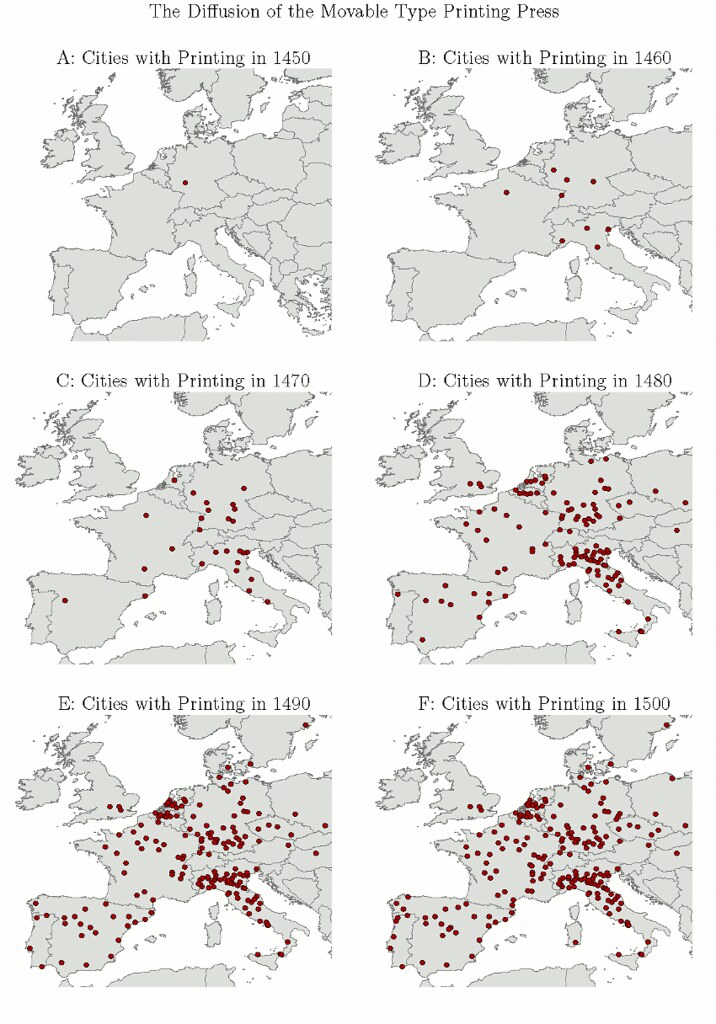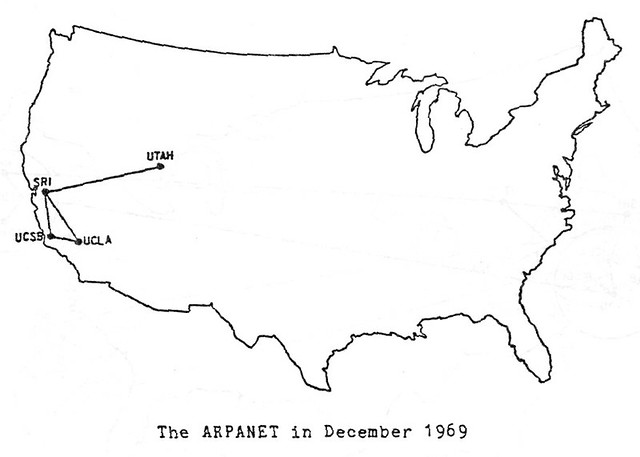“The Long Bust”
Ahhh, the 1990s. For those of us beginning to adult in those days, it was pretty heady – the world was changing, America was on top, and it was right that America was on top. And for those involved, or even watching, the internet boom, the future was full of eternal sunshine and spotless minds as the world was changing into a better place, with computers (and the internet) being the tools of the future which would make this happen. As one in his early thirties when this article came out … while seeming a bit fanciful at times (20 years to people on Mars was insanely optimistic at the time, and the authors admitted this) … this was a perfect encapsulation of the Clinton-era, internet boom zeitgeist: The US is winning and will continue to win. Science and technology will lead the way. And I shared this belief.
I am not interested in picking this article apart piece by piece – upon my re-readings, it seems that you could argue that about 30% of the predictions came true. Not even going to discuss the implied sexism of statements like “By the 1990s, women have permeated the entire fabric of the economy and society” (‘Permeated’? Really? Good job, ‘women’! You permeated the sieve of society!).
And then there is the out and out paternalistic racism of passages like:
The entire attitude of a backward continent completely unable to handle modern civilization, needing the ‘advanced’ societies to save it from itself, (the only notable exception being the white, apartheid areas of South Africa – they get it, for reasons completely unknowable (this is sarcasm)), is just so goddamned cringe. Note that in the author’s vision, ‘destitute’ Africans use a new disease to commit biological warfare out of political animus, their tribal instincts forcing them to reject the values of modern civilization as they try to infect their fellow Africans.
Oh. Can you imagine the damage that could be done if segments of this country decided to promote a pandemic by demoting science and public health out of ideological delusion? Good thing the US, the country TLB spends 20 paragraphs praising, is above all that! Whew!
But… but I’m going to be frank – twenty-five years ago, I read that passage myself and 1997-me? Didn’t even blink.
I’m more interested in the two big areas of failure – their historical analysis and the complete and total silence on the impact the internet will have on mental health. Had they thought about what was really happening – a full-blown revolution in the way humanity relates and communicates to each other – as opposed to the more mundane, technical projections of “Here’s what can happen when computers are interconnected and people start behaving like white male tech bros”, this project of ours would be more sparing as their predictions would have been more accurate, would have, in fact, mirrored the sidebar.
What strikes me about this article is the authors were not thinking big enough and small enough . Reading their historical references, one is struck how the article focuses on recent history, the most dated reference being the world of 1890. In addition, ‘trendism’ – “If present trends continue, this is what our World Of Tomorrow will look like” – is the driving force behind many of these predictions, making them more… projections, than predictions. And, to be fair, if you asked me to predict the world 25 years from now, I, too, would fall prey to projecting current trends out 25 years. It’s easy and can be done in Excel. Even Excel 97.
What was happening in the 1990s wasn’t a trend to be teased out in a chart of numbers. It was a paradigm shift and truly recognized as such. But this article ignored previous paradigm shifts so that while it may be reasonably accurate (as far as these things go), the global tone of the past 25 years, especially for the ‘middle class’ and lower, the bottom, say, 80% of society… the tone could hardly be described as “booming”.
Quite the opposite.
In the early 1990s I became interested in communications revolutions, largely stemming from a copy of Elizabeth Eisenstein’s masterful two-book series Printing Press as an Agent of Change (abridged and popularized to The Printing Revolution in Early Modern Europe). In these books, Professor Eisenstein lays out a clear and convincing case the printing press not just created the modern world, it also destroyed the world which created it: medieval Christendom. And it did this by revealing the thoughts people had hidden… about the Church, about their neighbors, about their local priests… forcing Europe to slowly realize the consensus which brought about Christendom was a hollow facade.
Sixty years after the Press was invented, as the technology spread throughout Europe…
… Christendom exploded in an internal debate regarding one of the revenue streams of the Catholic church, the ability to buy pardons from sins. And, fueled by the new communications technology, this debate quickly morphed into a debate about the very nature of Christian civilization itself. You can track this shift from 1517-1521 as Luther writes (and prints!) about the evolution of his thoughts, from the beginnings of ‘maybe it’s wrong to sell pardons in the marketplace?’ to ‘Who the hell is the Catholic Church to tell us Germans what to do? The Pope is the Antichrist!’, all in a space of four years.
For the reader of Reformation-era texts, the emotion which sticks out is how angry everyone became in just a short span. In 1517, Luther prefaced his 95 theses with “ Out of love of the Faith and the desire to bring it to light… ”. By 1521, Luther had radicalized himself, and the world, with such passages as “ If we punish thieves with the gallows, robbers with the sword, and heretics with fire, why do we not all the more fling ourselves with all our weapons upon these masters of perdition… ”.
One can read Luther’s transformation from an everyday normal guy into Facebook-ranting grandpa in four short years, and the same goes for other figures of the day – Ulrich von Hutton, John Calvin, more. The entire tone of European civilization just took a nasty turn around 1520, mirroring our world where we somehow went from The Long Boom to the world today.
As Eisenstein noted, the intellectual worlds which grew out of the printing press… the Renaissance, the Reformation, and the Scientific Method… were increasingly at odds with the civilization which spawned them, in time proving fatal to the medieval order . Europe sunk into a series of wars of religion extending 130 years after Luther’s initial protest, finally ending when a weary continent decided that not only was religion not worth fighting over, Europe came to a consensus that perhaps focusing on national and economic interests were a better means than religion by which to organize the post-printing press society.
And almost five hundred years after Gutenberg did his first print run, the pattern repeats itself again, with a communications technology as different from books as books were different from oral tales:
1969:
1973:
1992:
Here we are, sixty years after DARPANET was willed into existence, the United States being fragmented by its own creation, much as the Holy Roman Empire was mortally wounded by the multiplicity of presses. 30% of today’s citizenry already living in an alternative reality regarding the ‘science’ and ‘facts’ of the COVID-19 virus, and this fragmentation and, yes, irritation, will only increase.
The rise of authoritarianism and disinformation, both fueled by the internet, was completely and utterly missed, other than the vague references to if we go to a ‘closed’ system, highlighted in this paragraph:
This ties into the other major criticism I have with the piece: The authors didn’t enter the human heart and ask themselves “what is this going to do to us personally?” Having been on the internet (starting with USENET) since the mid-1980s, I am struck how the article completely ignored the even then apparent fact that being on the internet made people nastier to each other… just as the power of the press made 16th-century Europe a mean, cruel place to be.
Surely, someone at Wired had been a participant at *The Well* , founded in 1985 and billed as the first online community. If you’re going to extrapolate a trend, extrapolate what happened at the Well – people got nastier to each other. And the pattern established at The Well was a pattern repeated for, mostly, all 5+ billion who would get online over the next 2 decades: Because of the anonymity (real or assumed), people would say things they wouldn’t say in a hand-written note, much less in person. And when this anonymity was removed, people remained just as nasty.
And there were enough internet-experienced people in 1997 who had witnessed this behavioral change, even working at Wired , and yet none of them thought about what would happen if 5 billion people logged on and all 5 billion started acting like keyboard warriors, message board bros, and the other assorted asshats of internet civilization which were already apparent and in existence in 1996.
Which is really odd given Wired published a cover feature on The Well, the worlds first online community, the harbinger of message boards, MySpace, Facebook, the SDMB, and more. And they published this a mere two months before the “Long Boom”!
In writing about The Well, Katie Hafner, the author of “The Epic Saga of The Well” gets a glimpse of the future when she pens:
Even John Coate, one of the principal figures in The Well’s development and heavily featured in the above article, wrote in 1992 about trolling and the eagerness of people to get mad in his essay Cyberspace Innkeeping: Building an Online Community, which he discusses “fermenting”:
Note that Coate is discussing “hosted” or “moderated” discussions. He doesn’t even consider the impact of unmoderated discussions, which is what Facebook brought to the world just eight years later: eternal ferment among 2 billion users, almost all with no moderation. And this model is being replicated via Twitter, LinkedIn, Instagram, and other social media platforms – get the ferment going and profit.
And the result? Arab springs. COVID denialism. Millions of people embracing harmful delusions such as Qanon, the Big Lie, Brexit, and more. A world that may be more efficient because of the internet, but that’s only if you look at the trend lines and ignore both the larger and smaller, pictures.
By ignoring the heart, the authors missed the larger civilizational crisis, of a population being torn asunder by a ferment, much of it being used to destroy the underpinnings of the very liberal democracy which invented the internet. As it turns out, the United States is not stronger because of our multiculturalism, we have become weaker because we have introduced a technology which is fragmenting reality in a country which itself is nothing but a shared, mass delusion.
Instead of The Long Boom, only enjoyed by the Tech giants who have won at everything in the past 25 years, within our hearts and in our collective civilization, the internet is bringing about The Long Bust.
JT
Discussions of the future on the Straight Dope are almost too numerous to mention – from the future of the GOP, discussed in 2012, or this lively 2008 debate on the future of religion, or even sometimes we would get our mind bent somewhat and start a 117-response discussion to whatever this 2004 thread is all about.
However, in conjunction with DopeZine vol 1, feel free to lay down your 25-year predictions for the year 2047, I’ll put a reminder on my calendar and if I’m still around 24 and a half years from now, we can do to ourselves what we’re doing to Wired.



